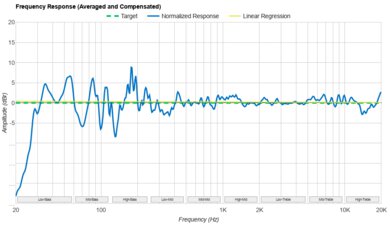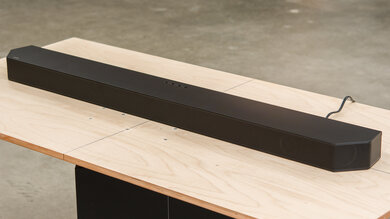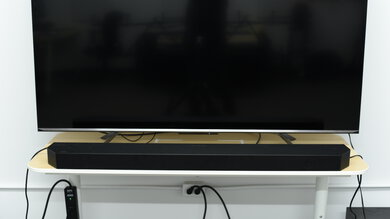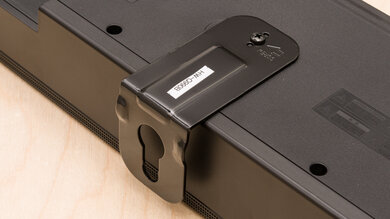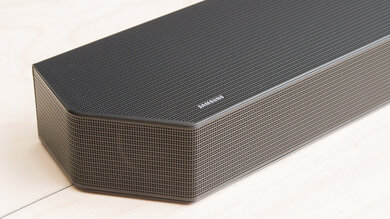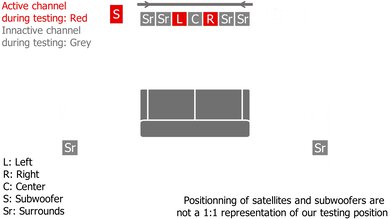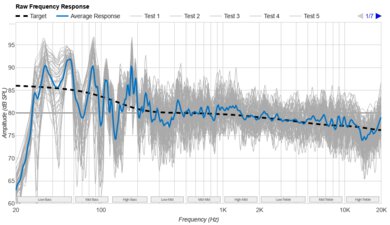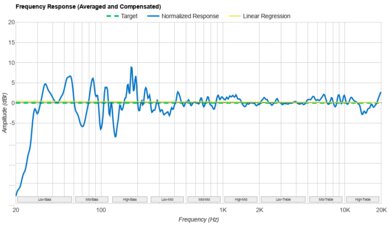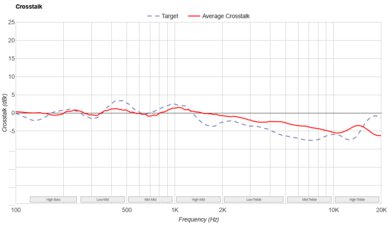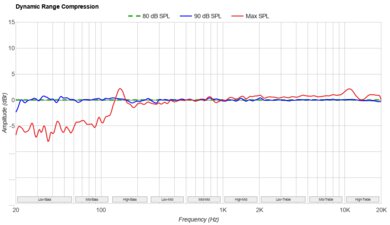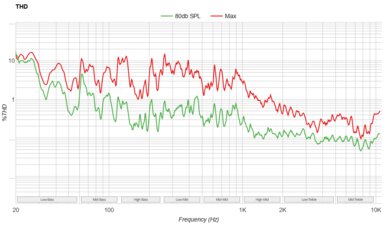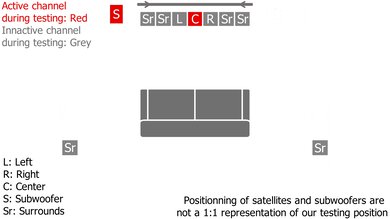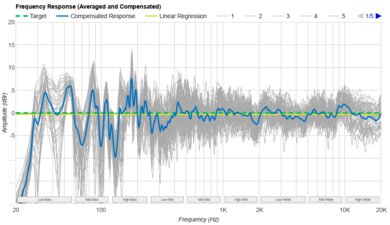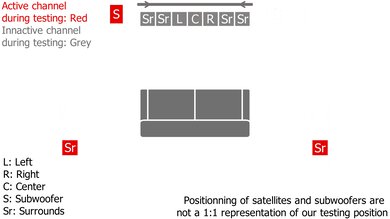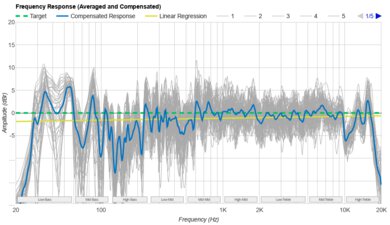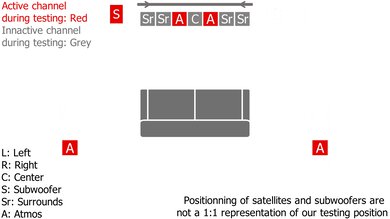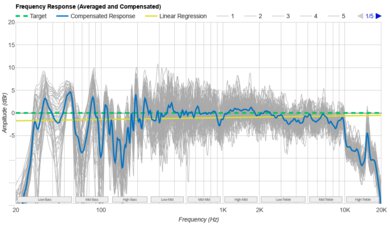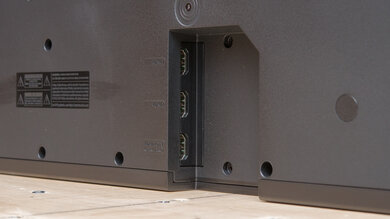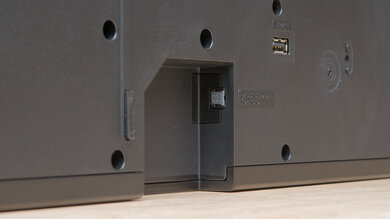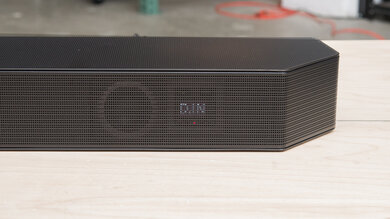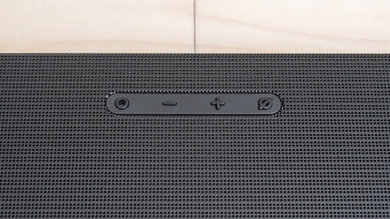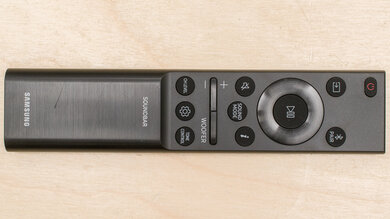The Sony HT-A7000 is a premium 7.1.2 setup released in 2021. It's advertised to support S-Force Pro Front Surround and Vertical Surround Engine technologies for a more immersive listening experience. Its default sound profile is pretty neutral with a touch of extra punch in the bass, making it suitable for listening to most types of audio content. However, it doesn't get very loud. Also, in our subjective listening tests, we found that it's best to adjust the EQ preset based on the content you're listening to, which could be annoying for some users.
Note: You can upgrade this soundbar with a subwoofer and satellites, sold separately. These results represent the standalone bar, but we also tested the full Sony HT-A7000 with Speakers + Bass Module.
Our Verdict
The Sony HT-A7000 soundbar is satisfactory for mixed usage. Thanks to its balanced, neutral sound profile, it's suitable for most types of audio content, and there's even a little extra punch in the bass. However, it struggles to reproduce the deep thump in the low-bass. Also, its surround and Atmos performances are disappointing. That said, you can always upgrade this setup with a dedicated sub and satellites.
- Lots of wireless playback options.
- Room correction feature.
- Doesn't get very loud.
- Lacks low-bass.
The Sony HT-A7000 soundbar is good for dialogue-centric content like TV shows. Its discrete center channel can more accurately localize voices to a pinpoint location within the sound image, and its balanced frequency response reproduces dialogue clearly and accurately. There's even a dialogue enhancement feature to make voices more clear and crisp. However, it doesn't get very loud, which can be disappointing.
- Dialogue enhancement feature.
- Lots of wireless playback options.
- Doesn't get very loud.
The Sony HT-A7000 is decent for music. It has a room correction feature called Sound Field Optimization that automatically optimizes audio reproduction based on the acoustic characteristics of your room. Its frequency response is neutral, with a bit of extra boom in the bass, making it suitable for most music genres. However, it struggles to reproduce low-bass, so you don't feel the deep rumble in genres like EDM and hip-hop. There also aren't a lot of sound customization options.
- Room correction feature.
- Good stereo soundstage.
- Doesn't get very loud.
- Lacks low-bass.
The Sony HT-A7000 is decent for movies. Its neutral sound profile helps reproduce dialogue clearly and accurately, but it lacks low-bass, so you don't feel the deep rumble in action-packed scenes. It supports surround and Atmos content, though its performances are disappointing overall. Also, it doesn't get very loud.
- Room correction feature.
- Good stereo soundstage.
- Doesn't get very loud.
- Lacks low-bass.
Changelog
- Updated Jul 26, 2024: We've added a comparison between this soundbar and the Sony BRAVIA Theater Bar 9 in Height (Atmos).
- Updated Sep 14, 2023: Updated text in Video Passthrough to TV box for clarity. No changes in test results.
- Updated Sep 11, 2023: Updating the bar to firmware version 1.779 adds support for ALLM and HDMI Forum. The Video Passthrough to TV score improves from 8.4 to 9.5 as a result.
- Updated Jun 14, 2023: After TBU 1.2, added more information to the Video Passthrough to TV box to clarify our results.
Check Price
Differences Between Sizes And Variants
This soundbar is available in Black, and you can see the label for the model we tested here.
These results aren't valid for the full setup with the subwoofer and satellites, sold separately. You can also see the results for the full Sony HT-A7000 with Speakers + Bass Module.
If you come across another version of this soundbar, let us know in the discussions, and we'll update our review.
Popular Soundbar Comparisons
The Sony HT-A7000 is a 7.1.2 setup with a premium design. Thanks to its S-Front Pro Front Surround and Vertical Surround Engine technologies, it offers a wide soundstage for an immersive listening experience. Compared to other soundbars in its price range, it doesn't get very loud, and it lacks some low-bass.
See also our recommendations for the best soundbars, the best Dolby Atmos soundbars, and the best Sony soundbars.
The Sony HT-A7000 and the Sony BRAVIA Theater Bar 9 are similarly performing bars with a couple of differences to help set them apart. The BRAVIA Theater Bar 9 is intended to be paired with compatible BRAVIA TVs so that you can take advantage of Acoustic Center Sync, which lets you use your TV as a center channel alongside the bar. Additionally, there's also Voice Zoom 3, which is a feature designed to improve dialogue reproduction by amplifying their sound. That said, when it comes to performance, the HT-A7000 has a more premium build, and its stereo soundstage feels more spacious and wide. Some users will also appreciate the Optical connection.
The Bose Smart Soundbar 900 is a bit better for mixed usage than the Sony HT-A7000. The Bose has better soundstage, surround, and Atmos performances. It also gets louder, albeit with more compression at max volume. However, only the Sony soundbar supports DTS content and has a Full HDMI In port.
The Sony HT-ST5000 is better than the standalone Sony HT-A7000. The HT-ST5000 comes with a dedicated sub, so it's able to reproduce a more extended low-bass. It also has better Atmos and surround performances. However, the HT-A7000 has more sound enhancement features, such as room correction and Acoustic Center Sync for users with Sony BRAVIA TVs. You can also upgrade this setup with a sub and satellites for better performance.
The Sony HT-A7000 is a bit better than the Sony HT-A5000. The HT-A7000 is a better built 7.1.2 setup with a better soundstage performance. It also comes with an additional HDMI input. However, the 5.1.2 HT-A5000 gets a little louder with less compression at max volume.
Test Results

